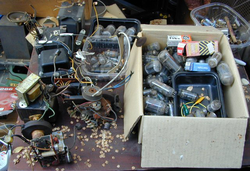
Junk box
Encyclopedia

Amateur radio
Amateur radio is the use of designated radio frequency spectrum for purposes of private recreation, non-commercial exchange of messages, wireless experimentation, self-training, and emergency communication...
operators (hams) to describe a collection of spare parts and old equipment kept to assist in building and repairing their station.
Description and uses
According to some hams, a well-stocked junk box is a requirement for anyone who likes to build, repair, or tinker with radio equipment and electronic gear. Keeping an ample supply of spare electronic components provides the ham with parts to build a variety of electronic projects, as well as "spares" of components needed for repairs. Resistors, capacitors, transistors, meters, speakers, wire, cable, and even small mechanical parts such as screws, nuts and bolts are typical junk box items. CannibalizingCannibalization of machine parts
Cannibalization of machine parts, in maintenance of mechanical or electronic systems with interchangeable parts, refers to the practice of removing parts or subsystems necessary for repair from another similar device, rather than from inventory, usually when resources become limited...
or removing parts from old equipment is sometimes the only way for an individual to obtain some types of parts, either because they are no longer made, or can only be ordered in large quantities. Cast-off or used electronic equipment make especially good additions to a junk box. What non-hams may see as junk, hams often see as treasure. Hamfest
Hamfest
A Hamfest is a convention of amateur radio enthusiasts, often combining a trade show, flea market, and various other activities of interest to amateur radio operators . In the United Kingdom the term rally is more commonly used for amateur radio conventions...
s, surplus stores, electronic swapmeets and even dumpster diving
Dumpster diving
Dumpster diving is the practice of sifting through commercial or residential trash to find items that have been discarded by their owners, but that may be useful to the dumpster diver.-Etymology and alternate names:...
are often venues for hams to trade, buy, scrounge, or salvage spare parts and components. Junk boxes can range in size from small carboard or plastic boxes, to large collections that fill garages and outbuildings. Many hams derive satisfaction from having an especially large junk box full of exotic and hard-to-find components. Others feel that the act of tracking down parts is half the fun.
Use in homebrewing
HomebrewingAmateur radio homebrew
-History:In the early years of amateur radio, long before factory-built gear was easily available, most hams built their own transmitting and receiving equipment, a process that came to be known as "homebrewing." In the 1930s, 40s, and 50s, hams handcrafted reasonable-quality vacuum tube-based...
is a slang term in amateur radio referring to building an alternative to a commercially available piece of equipment or accessory by hand. "Homebrewers" often naturally maintain a sizeable junk box, and amateur radio publications have often employed the term in DIY project articles such as "The 'Junker' Amplifier" from QST
QST
QST is a magazine for amateur radio enthusiasts, published by the American Radio Relay League . It is a membership journal that is included in membership with the ARRL. The publisher claims that circulation of QST in the United States is higher than all amateur radio-related publications in the...
, Oct 1970 , an RF amplifier built from scrounged and junk-box parts.

